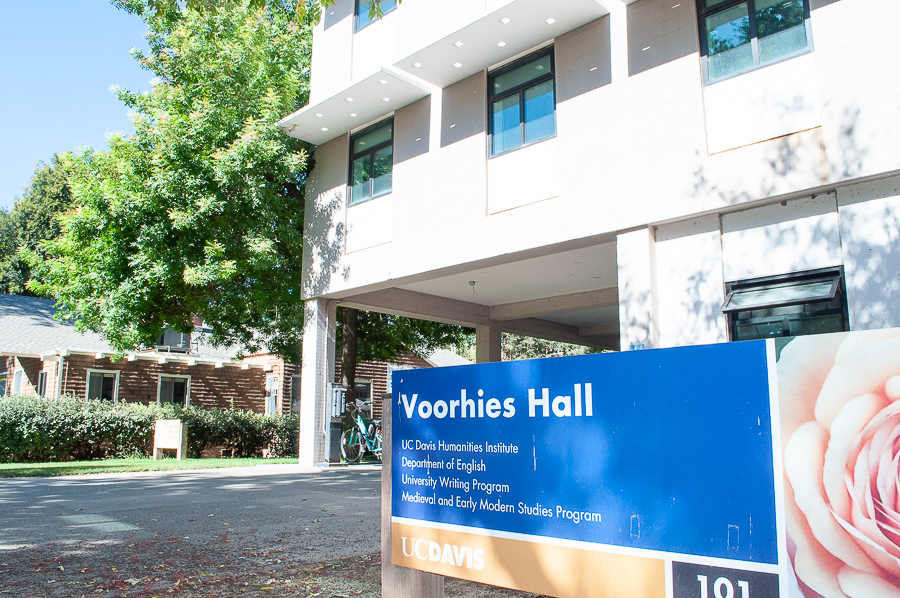
UC Davis English department introduces new graduate program to begin in 2019
The UC Davis English department will introduce a new two-year graduate program, a Master of Fine Arts Degree in Creative Writing (MFA), starting in the 2019-20 school year. The program is heavily focused on “studio time” meaning that students will concentrate on creating their own original work rather than simply studying books by other authors.
Fourth-year Talia Basma is currently pursuing a degree in English and hopes to earn an emphasis in creative writing. With graduation around the corner, Basma has been considering submitting an application to Davis’ new MFA program to further her education in creative writing.
“I only just started really looking into MFA programs,” Basma said. “I like the idea of applying to the UC Davis MFA program for a number of reasons including that the school isn’t too far away from my family [and] I love Davis as a school and place.”
Basma explained how the MFA differs from other creative writing programs she has been looking to apply to.
“The program seems to be very focused on creative writing, which is surprisingly hard to find,” Basma said. “I keep finding schools that supposedly have a great creative writing program, but then when I look further into it, they are actually more English [theory] focused and have creative writing on the side.”
However, being in a beginner program also comes with its faults, including lack of resources or experience. Basma weighed out the pros and cons of being a student in a new program.
“[The] fact is that it is so new can be good in that you get this experience where you’re working with the professors as everyone tries to figure the system out,” Basma said. “Yet that exact thing could be seen as a con because maybe you don’t want to deal with being a ‘lab rat’ and just want to get through the program.”
As for pros, Basma explained how a new program could also be extremely beneficial to students.
“Because the program is so new, it will probably be comparatively smaller than some other programs which will allow more intimate relationships between peers and professors,” said Basma. “This is definitely a good thing for writers because you want people who will read your work and help you improve, but also keep your voice intact and not change the writing to be something else entirely.”
Dr. Katie Peterson, an associate professor of English at Davis, illustrated a more detailed picture of what students can expect from the classes in the program.
“A great aspect of the MFA is that it pairs workshop instruction in writing with seminar classes in literature,” Peterson said. “Our students will study writing and reading at the same time. We think one of the best ways to learn to write is to read deeply and variously and democratically – we don’t think you can do your best as a writer without studying books. If you want to write a book, you have to read some books and see how it’s done. And we’ve all been so buoyed in our work by those writers that we admire – poets and storytellers of the past and this present moment who refresh our perceptions and teach us how to see.”
Peterson explained what measures the faculty has taken to ensure that students coming into the program don’t feel like test subjects.
“The program is very similar to what we’ve been teaching for years here,” Peterson said. “The MA degree in Literature and Creative Writing was innovative during its time for integrating the reading of books and the writing of one’s own work. But the MFA became the accepted degree in the field, and we want to offer people not just an excellent curriculum but a degree they can use. But we’ve been teaching writers for years who go on to win significant awards in the field, publish with the best presses and do great work. We want to keep doing what we’ve been doing and do it better.”
For students looking to apply to the program for the following academic year, Peterson offered some insight as to what the admissions board is looking for in applicants.
“We are looking for your best, your most strange, your most memorable, your most bizarre and beautiful and heartbreaking work of any genre,” Peterson said. “Emily Dickinson famously said she knew it was poetry if she felt like the top of her head had come off. We want students whose work dares and risks and uses language with gravity and grace and shine and substance. We want writers who wish to take spiritual and personal risks and not simply write publishable or finished pieces.”
Undergraduate students who are not majoring in English, but still have an interest in creative writing can to take English 5F and 5P or apply to the 100-level creative writing program. Both courses have a rather small class size and are taught by writers publishing books in various genres, giving students a greater understanding of the various aspects of creative writing.
“We’re looking for people who keep coming back to language to think about the world and who need to write in order to do that thinking,” Peterson said.
Written by: Sneha Ramachandran — features@theaggie.org



